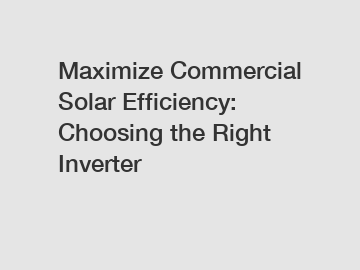Maximize Commercial Solar Efficiency: Choosing the Right Inverter
Maximize Commercial Solar Efficiency: Choosing the Right Inverter.
Solar energy has become increasingly popular among commercial establishments looking to reduce their environmental impact and save on energy costs. One crucial component in any commercial solar system is the inverter, which converts the DC power generated by solar panels into the AC power that can be used to power buildings and equipment. Choosing the right inverter is essential for maximizing the efficiency and performance of a commercial solar installation. In this article, we will discuss the factors to consider when selecting an inverter and how it can impact the overall efficiency of your solar system.
Importance of Inverter Selection.

The inverter plays a pivotal role in the overall efficiency and performance of a commercial solar system. It is responsible for converting the direct current (DC) energy produced by solar panels into the alternating current (AC) energy that can be used by commercial buildings and equipment. Therefore, the quality and reliability of the inverter directly impact the performance of your solar installation.
Efficiency Ratings.
When choosing an inverter, it is crucial to consider its efficiency ratings. Efficiency is the measure of how much DC energy from solar panels is converted into usable AC power. Higher efficiencies translate into greater energy production, better performance, and ultimately, more significant savings. Look for inverters with high peak efficiency ratings, as this indicates better performance even during challenging weather conditions.
Inverter Types.
There are three primary types of inverters commonly used in commercial solar installations: string inverters, microinverters, and power optimizers. Each has its advantages and considerations, depending on the specific requirements and constraints of the project.
1. String Inverters: String inverters are a popular choice for commercial solar installations as they are cost-effective and efficient. They connect multiple solar panels together in series, converting the collected DC energy into AC power. String inverters are typically installed outdoors and require proper ventilation to prevent overheating. They are best suited for projects with consistent shading conditions and large-scale installations.
2. Microinverters: Microinverters are installed on each individual solar panel, offering maximum reliability and energy production. They work independently, ensuring that the performance of each panel is not affected by the performance of others. Microinverters are ideal for installations with complex shading conditions or systems with panels facing different orientations. Although microinverters tend to be more expensive than string inverters, they provide better energy harvest and monitoring capabilities.
3. Power Optimizers: Power optimizers combine the advantages of string inverters and microinverters. They are attached to each solar panel in a system and optimize the power output of each panel individually. Power optimizers maximize the performance of the entire system even when the conditions are not ideal for all panels, such as shading or soiling. They are suitable for installations facing uneven sunlight conditions or those prone to shading.
Conclusion.
Selecting the right inverter is crucial to maximize the efficiency and performance of your commercial solar system. Consider factors such as efficiency ratings, inverter types, and the specific requirements of your project. By choosing the right inverter, you can ensure that your solar installation delivers optimal energy production, cost savings, and environmental benefits.
To explore the best inverter options for your commercial solar project, contact us today. Our team of experts will guide you in making the right choice and provide valuable support throughout the installation and maintenance process. Start harnessing the power of solar energy and take a step towards a sustainable future.
For more how to choose the right solar inverter, what is a 3 phase inverter, how does a 3 phase solar inverter workinformation, please contact us. We will provide professional answers.

Comments
0